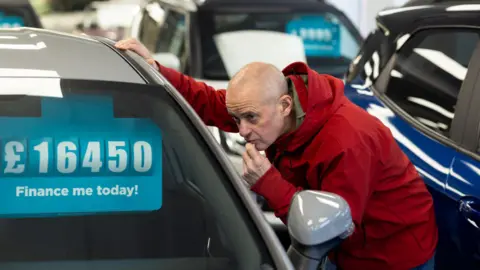UK car firms urge help as Trump tariffs loom
 Getty Images
Getty ImagesUK car firms are seeking support from the government as hopes fade a deal can be reached with US President Donald Trump over US tariffs.
Companies met with industry minister Sarah Jones on Friday morning to discuss their response to plans for 25% tariffs on US car imports from next week, the BBC understands.
The UK government is trying to negotiate exemptions from a wide range of US import levies due to come into force at midnight on 3 April.
But some car companies believe it is now too late to delay the measure, and instead want to discuss support options.
Insiders with knowledge of the "well-attended" online meeting, said car firms outlined the challenges they faced, saying tariffs came on top of other pressures such as the Zero Emissions Vehicle (ZEV) mandate.
The BBC understands that there was a consensus the government should make every effort to reach a deal. But the government was "in listening mode" and did not put forward any responses.
There was also no indication that an agreement could be reached with the US on tariffs before the introduction next week, one source said.
US tariffs could have a huge impact on the UK economy, with the government's official forecaster estimating that in a worst case scenario taxes could reduce economic growth by 1% and wipe out Chancellor Rachel Reeves's £9.9bn headroom against her debt rules.
Government sources said there is "still all to play for" in negotiations over 25% tariffs placed on car imports into the US ahead of next week.
The UK has said it will "not be jumping into a trade war" with the US. Treasury minister Darren Jones said the UK has to take a "different approach" to other countries when it comes to negotiating tariffs with the US.
Jones said "there is no easy answer" and there are "complicated issues" to be discussed.
While the government said it was "disappointed" by the decision to impose tariffs on cars, it said the US was "an indispensable ally" and Britain was taking a "pragmatic" approach to import taxes.
The UK response is in contrast with other nations such as Germany which has said it "will not give in" and urged Europe to "respond firmly" to the taxes.
France and Canada have vowed trade retaliation against the US, with Canada's new prime minister Mark Carney - the former governor of the Bank of England - saying his country would "fight", adding that the longstanding Canada-US relationship is "over".
'Significant threat'
Car firms across a range of countries saw their share prices fall sharply following Trump's tariffs announcement.
This included US automotive-makers such as General Motors, Ford and even Tesla, which is owned by major Trump ally Elon Musk.
Russ Mould, investment director at AJ Bell, said the tariffs come at "a very difficult time for the industry" with UK car production falling 12% in February compared to the year before.
"Consumer confidence is on edge, we know it's a highly competitive market, and even electric vehicles aren't perhaps quite selling as quickly as hoped," he said."
Ineos Automotive, a start-up carmaker, told the BBC the tariffs are a "significant threat" since the US is its biggest market and its manufacturing is based in the European Union (EU).
Ineos chief executive Lynn Calder said she was "hugely frustrated" that EU politicians had "sat on their hands" and "not come to the negotiating table" with Trump.
"Mr Trump was talking very early in the year about reciprocal and fair tariffs," she said. "There was a deal to be done here, there was a win-win solution."
"I think we're at a situation right now where the EU decides whether it wants an automotive industry or not," she added.
Trump has used powers designed to avert national security threats to levy the tax.
An initial wave of tariffs on cars are due to come into force on 3 April, with import taxes on auto parts following a month later.
Vehicles are the UK's biggest export to the US, totalling 101,000 last year worth £9bn.
The industry is likely to ask for a support package from the UK government to manage the disruption.
The government is already consulting on changing the mandate for zero electric vehicles, which could end up costing UK manufacturers and subsidising importers such as Tesla, which is controlled by key Trump ally Elon Musk.
The mandate sets out the percentage of new zero emission cars and vans that manufacturers will be required to sell each year up to 2030.
Reeves has told the BBC that Tesla gets some money from the ZEV mandate.
Any tweak to it could help UK exporters but disadvantage Tesla, which specifically wrote to the new government last July to ask them not to change it.
Only a handful of ministers and officials know the content of the UK's talks with the US administration, which are believed to be about the whole package of tariffs, not just the car sector.
While progress has been made, one negotiator said it will all come down to Trump.
Earlier this week he insisted there would be no carve-outs for car imports, but deals are being done across the globe over wider so-called "reciprocal tariffs" expected next week.
